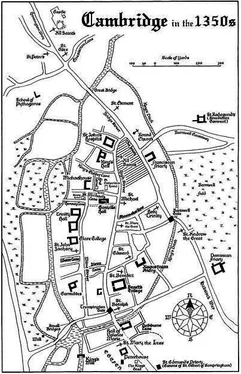People also seemed bemused by the fact that the river had iced over, and that some traders were experiencing difficulties in transporting their goods along the waterways that wound through the Fens. It was as if it had never happened before, and people discussed the weather at every street corner, remarking that it was the most severe winter they had ever known, and that times were changing for the worse. Friars and lay-preachers were out in force, exhorting all who would listen that the climate was a sign from God that evil ways had not been sufficiently mended after the warning of the plague. The world would end in ice and fire, they claimed, if folk did not repent, wear sober clothing, give away all their possessions to the poor, cut their hair and wear sackcloth, be kind to animals and avoid the town’s prostitutes.
Cynric met Bartholomew on the High Street, and when he heard that the physician intended to visit the King’s Head to tend Harysone, he insisted on accompanying him. Bartholomew did not object, glad to have Cynric and his ready blade behind him when he entered the notorious tavern. They passed through the Trumpington Gate, and walked the short distance to the inn, which stood opposite St Edmund’s Priory. The priory doors were firmly closed, suggesting the Gilbertines wanted no part in the noisy Christmas revelry that was taking place in the rest of the town. The King’s Head, on the other hand, was bursting at the seams. As Bartholomew and Cynric approached, two men hurtled through the door and rolled across the trodden snow of the road, where they climbed groggily to their feet. The door slammed behind them.
‘Now look what you have done,’ said one. ‘You got us thrown out.’
They walked away arm in arm, although their progress was unsteady. Bartholomew drew his cloak more tightly around his shoulders to disguise the fact that he wore a scholar’s tabard underneath, and opened the door with some trepidation.
He need not have worried. The inn was full of people he knew, all of whom raised their goblets to him in festive salutation. Some were patients, who came to mutter weepy-eyed gratitude for past treatments, while others worked at Michaelhouse. Although taverns were not places where women were found with much regularity, Agatha was different. She sat in a large seat near the fire, and held forth to a group of townsfolk who nursed ale in calloused hands and prudently nodded agreement from time to time.
‘You know you cannot come in here,’ said the taverner to Bartholomew with a sanctimonious expression on his face. ‘The University forbids me to sell ale to scholars.’
‘So I understand,’ said Bartholomew, looking hard at a group of young men who were attempting to make themselves invisible by huddling into their cloaks. They were the Franciscan friars from Ovyng, and the burly Godric was at the head of their table. Godric flushed deep red when he saw he had been recognised, and buried his face in his jug. ‘I was summoned by Master Harysone. Is he here?’
‘Oh,’ said the taverner, relieved. ‘I thought Brother Michael had sent you to see whether I would sell you a drink. It is Harysone you want, is it? He is in his chamber, unwell. It is not because of my cooking, though – and you can tell him that.’
Bartholomew climbed the stairs and knocked at Harysone’s door. A weak voice told him to come in. He flipped open the latch and entered one of the tavern’s more pleasant rooms. Fresh rushes were strewn on the floor, and the walls had been painted with hunting scenes. A huge pile of books near the window caught the physician’s attention. They were crudely made, with heavy wooden covers sandwiching a thin layer of parchment. There were at least thirty copies, and he wondered how many of the things Harysone intended to sell in Cambridge.
Harysone lay on the bed, fully dressed, even though there was a fire blazing in the hearth and the room was stuffy. For the first time, Bartholomew was able to study him at close quarters. Harysone’s teeth were his most arresting feature: they were long and yellow, and it did not seem possible that they could be real. His next outstanding characteristic was his eyes, which glittered like a rodent’s, and Bartholomew sensed something highly unpleasant about the man. Even the thought of those moist orbs settling on Matilde made him nauseous.
‘Are you the physician?’ Harysone asked. ‘Close the door; you are letting the cold air in.’
Bartholomew complied. ‘What can I do for you?’
‘In a moment, in a moment,’ said Harysone testily. ‘First, I must establish whether you are sufficiently well qualified to treat me. Where did you train, and what books have you read?’
‘I studied at the universities in Oxford and Paris,’ replied Bartholomew. ‘And I cannot possibly provide you with a list of all the books I have read. However, if you would like someone who can, I can suggest one or two names. Robin of Grantchester will not overwhelm you with medical knowledge.’
‘Not a surgeon, thank you very much,’ said Harysone with a shudder. ‘I do not like men who poke about inside men’s bodies with sharp knives. It is not natural. Are you a local man?’
‘I suppose so,’ said Bartholomew. ‘Why?’
‘Just conversing. I want to know something about you before I reveal any intimate secrets.’
‘There is no need for you to divulge anything personal,’ said Bartholomew, alarmed by the nature of the consultation Harysone seemed to have in mind. ‘I am a physician, not a confessor.’
‘Nevertheless, you will want to know details about my birth and suchlike, so you can construct a horoscope to determine my course of treatment. That kind of information is very personal, and might be dangerous in the wrong hands.’
‘I see,’ said Bartholomew, declining to mention that the date of a man’s birth was hardly sensitive knowledge. He stepped forward, wanting to examine the man, identify the cause of his illness, recommend treatment and leave. He found, again, that he appreciated exactly why Michael had taken such a dislike to Harysone, and why Matilde found him unsettling. ‘Shall I …?’
‘In a moment!’ repeated Harysone aggressively. ‘You are as bad as that landlord, all business and no time for a chat.’
‘Have you had chats with many other people here?’ asked Bartholomew, reluctantly taking the opportunity to question Harysone, since he seemed willing to talk about any subject other than his malady. He decided he would try to learn whether Harysone would admit to speaking with the Waits, as Quenhyth had seen him do, or sitting with Gosslinge, as the Waits had claimed.
Harysone pulled a face of disgust. ‘The patrons of this tavern are an uncivilised crowd. I wish I had arrived early enough to secure lodgings at the Brazen George, where the clientele is more genteel. Here, I have been obliged to pass time with blacksmiths, grave-diggers and even jugglers!’
‘Jugglers?’ asked Bartholomew innocently.
As Harysone regarded him with his wet eyes, Bartholomew had the feeling that the man knew he was Michael’s colleague and that his mention of the Waits was deliberate. Harysone had told Bartholomew he had met the entertainers, because he knew that he had been seen with them. He was covering his tracks. Bartholomew wondered why he should feel the need to take such precautions, and whether that in itself was significant.
‘Terrible folk,’ Harysone went on, eyes fixed unblinkingly on Bartholomew. ‘A number of us arrived in the town on the same day – the Chepe Waits, a fishmonger and his household, and me – so I suppose the jugglers imagined a bond between us. I put them right with one or two steely glances.’
‘What about Walter Turke? Did you talk to him?’
‘The fishmonger?’ asked Harysone disapprovingly. ‘I did not. The man is a lout, for all his fine clothes, and I wanted nothing to do with him, his fat wife or his snivelling retainers.’
Читать дальше












